

The latest chapter in the efforts to dismantle California’s public-sector retirement system was officially opened Tuesday when San Jose Mayor Chuck Reed submitted paperwork that begins the process of qualifying his latest pension initiative for next year’s statewide ballot.
The filing brings to a climax weeks of speculation about the timing of the proposed law after Frying Pan News first confirmed rumors of its existence when Gary Cohn published a leaked draft version last month and when we reported Reed’s remarks, delivered before a Hoover Institution conference on pensions, that indicated he was uncertain whether he would file for the 2014 or 2016 ballot. Now Reed is certain: It’s 2014 or never.
Called the Pension Reform Act of 2014, the measure seeks to rewrite California’s constitution in order to bypass its current guarantees of public pension rights. If passed by voters,
» Read more about: There Will Be Blood: Chuck Reed Files Pension-Cutting Ballot Initiative »

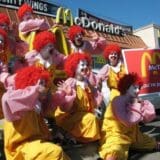
A spirited group of community, religious and labor activists gathered outside a Western Avenue McDonald’s today to connect their efforts to raise fast-food workers’ earnings with a new study disclosing how dependent such low-income employees are on public assistance.
Among the facts of low-income life that were dug up by the University of California, Berkeley Labor Center report:
“We’ve seen McDonald’s clown the workers and we’ve seen Ronald McDonald – did you like that?” the Reverend Lewis Logan asked at the top of the rally.
» Read more about: McDonald’s Rally Echoes UC Berkeley Fast-Food Study »
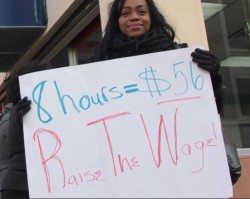
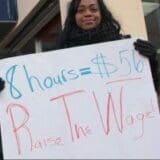
 A new study released today by the University of California, Berkeley Labor Center estimates that taxpayers contribute around $7 billion annually to provide basic social service benefits and health care to families of America’s expanding ranks of low-wage fast-food workers. The study, Fast Food, Poverty Wages: The Public Cost of Low-Wage Jobs in the Fast-Food Industry, also found that:
A new study released today by the University of California, Berkeley Labor Center estimates that taxpayers contribute around $7 billion annually to provide basic social service benefits and health care to families of America’s expanding ranks of low-wage fast-food workers. The study, Fast Food, Poverty Wages: The Public Cost of Low-Wage Jobs in the Fast-Food Industry, also found that:
» Read more about: Report: Fast-Food Workers Have One Foot in Poverty »
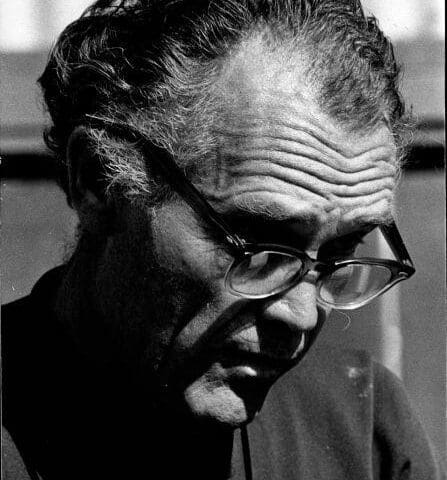
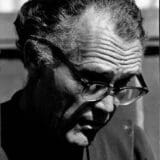
California State Senator (and former United Farm Workers activist) Bill Monning is sponsoring an effort on behalf of a broad coalition of activists and legislators urging Governor Jerry Brown to nominate Fred Ross Sr. for the California Hall of Fame. Ross, who mentored Cesar Chavez, Dolores Huerta, Eliseo Medina and multiple generations of great activists, was arguably the leading community organizer of his time. Although Ross died in 1992, his influence over current Latino voter outreach and labor organizing strategies remains strong. A national campaign began earlier this year to get President Obama to award him the posthumous Presidential Medal of Freedom.
Fred Ross Sr. spent 60 years in California working to bring social and economic justice. But he is not in the state’s Sacramento-based Hall of Fame, an omission that Senator Monning and others now hope Governor Brown will remedy.
On September 6, 2013, Monning, along with Senate leader Darrell Steinberg and many of their Senate colleagues,
» Read more about: Fred Ross Sr., California Hall of Fame Candidate »


 Investigative reporter Gary Cohen recently appeared on radio station KPFK’s David Feldman Show to discuss the strange liaison between the Pew Charitable Trusts and the libertarian Laura and John Arnold Foundation. Cohn had written a piece for Frying Pan News linking the respected research organization with the public-pension-cutting agenda of John Arnold, a billionaire hedge-funder. Cohn also broke a story about a proposed state ballot initiative that would change California’s constitution in favor of gutting the retirement plans of state and municipal employees.
Investigative reporter Gary Cohen recently appeared on radio station KPFK’s David Feldman Show to discuss the strange liaison between the Pew Charitable Trusts and the libertarian Laura and John Arnold Foundation. Cohn had written a piece for Frying Pan News linking the respected research organization with the public-pension-cutting agenda of John Arnold, a billionaire hedge-funder. Cohn also broke a story about a proposed state ballot initiative that would change California’s constitution in favor of gutting the retirement plans of state and municipal employees.
Listen here to a segment of Feldman’s show for a quick rundown of the Pew-Arnold alliance and what’s behind the move to cut funding for public pensions.
» Read more about: Radio: Gary Cohn Explains Pew-Arnold Alliance »
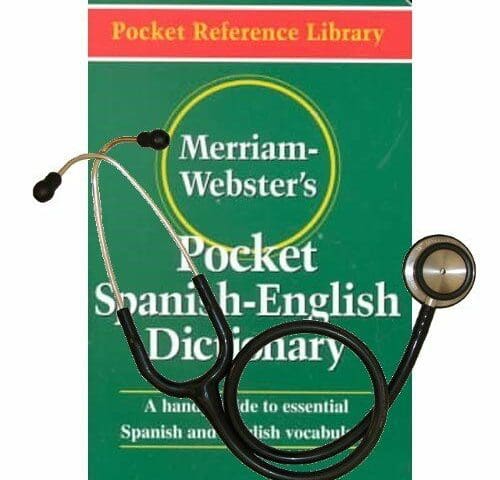
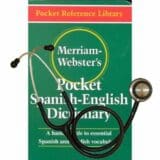
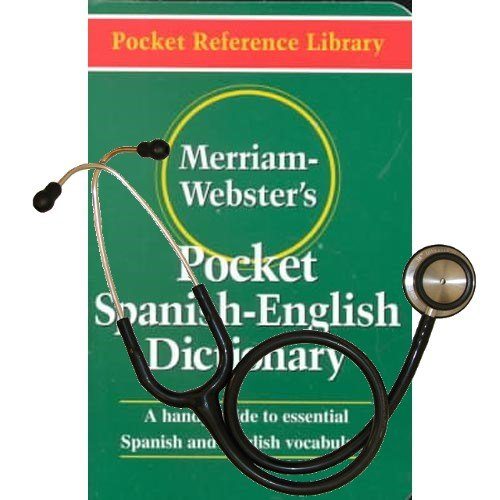 Governor Jerry Brown has included AB 1263, the Medical Interpreters Bill, in a group of bills passed by the California legislature that he vetoed. As Frying Pan News’ Gary Cohn wrote August 20, “Day after day, non-English speaking patients are seeing doctors and nurses throughout California without the aid of medical interpreters, sometimes with tragic results.”
Governor Jerry Brown has included AB 1263, the Medical Interpreters Bill, in a group of bills passed by the California legislature that he vetoed. As Frying Pan News’ Gary Cohn wrote August 20, “Day after day, non-English speaking patients are seeing doctors and nurses throughout California without the aid of medical interpreters, sometimes with tragic results.”
Cohn’s article highlighted stories in which Californians lacking fluency in English received harmful or unintended medical advice, or who were kept in the dark on the medical conditions of loved ones. AB 1263, authored by Assembly Speaker John A. Pérez (D-Los Angeles), would have spent $200,000 to gain access to $270 million in Affordable Care Act funds to create about 7,000 interpreter jobs within 10 years.
The governor vetoed the measure Sunday, commenting, according to the Sacramento Bee, that “California has embarked on an unprecedented expansion to add more than a million people to our Medi-Cal program.
» Read more about: Governor Vetoes Medical Interpreters Bill »
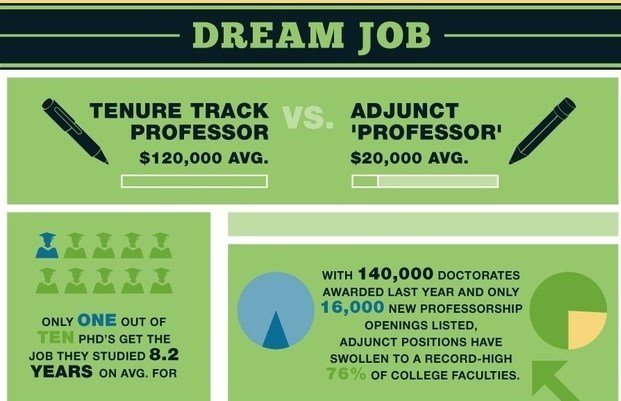
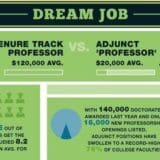
(See full infographic at OnlinePhdPrograms)
Driving a 15-year-old car 70 miles a day between three different college campuses took a toll on my ride – and on me. I was teaching as adjunct professor at three different L.A. community colleges. An adjunct is a part-time professor who is hired on a contractual basis rather than being given tenure and a permanent position. Many universities hire large numbers of adjunct faculty members because they are flexible and cheaper to maintain than traditional full-time faculty members.
I had no health insurance, no savings and no other financial resources, so every penny went to rent, car repairs and food. I was expected to hold office hours, but the colleges where I taught did not provide office space for adjuncts – I had nowhere to meet students or grade papers on campus.
» Read more about: Adjunct Faculty: Straddling the Poverty Line »


One by one, like guests at a late party
They shake our hands and step into the dark:
Arabian ostrich; Long-eared kit fox; Mysterious starling.
One by one, like sheep counted to close our eyes,
They leap the fence and disappear into the woods:
Atlas bear; Passenger pigeon; North Island laughing owl;
Great auk; Dodo; Eastern wapiti; Badlands bighorn sheep.
One by one, like grade school friends,
They move away and fade out of memory:
Portuguese ibex; Blue buck; Auroch; Oregon bison;
Spanish imperial eagle; Japanese wolf; Hawksbill
Sea turtle; Cape lion; Heath hen; Raiatea thrush.
One by one, like children at a fire drill,


 The New York Post reported that congressional gyms are staying open despite the government shutdown that, so far, has gone into its second week.
The New York Post reported that congressional gyms are staying open despite the government shutdown that, so far, has gone into its second week.
Andy Soltis of the Post wrote,
The taxpayer-subsidized gyms for members of Congress remain open despite the government shutdown.
The members have to rough it, though — going without trainers or attendants to provide fresh towels and other amenities.
The liberal organization Think Progress said Tuesday that the order to keep the House gym open came directly from Speaker John Boehner’s office.
The House gym — largely unknown to outsiders until Anthony Weiner took infamous photos of himself in the locker room in 2011 — has no sign on the door and members have to be buzzed in.
This exclusive health club in Washington D.C., which is subsidized by taxpayer dollars,
» Read more about: Capitol Dumbells: Congress’s Gym-Dandy Shutdown Perk »
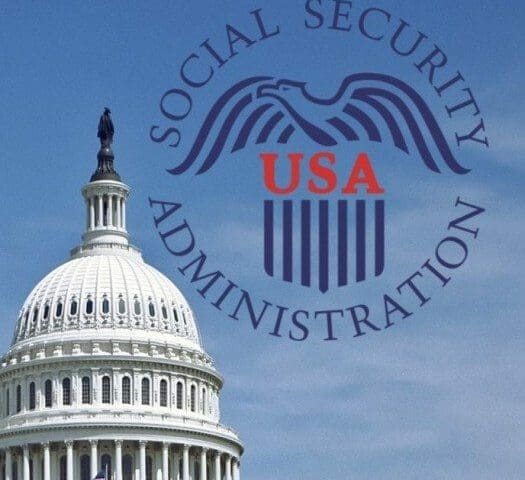

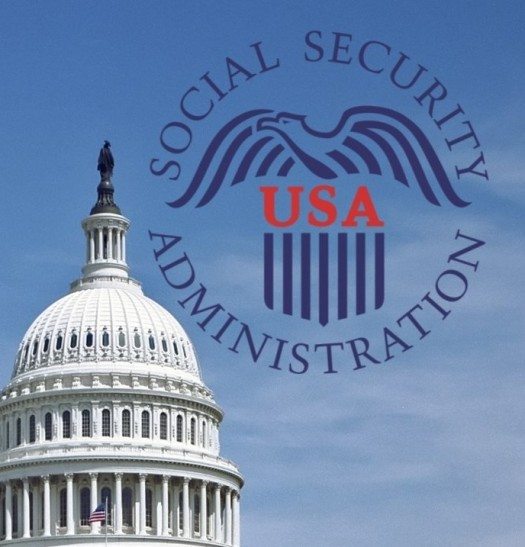 It is widely reported that the Republicans are looking for a face-saving way to back down from the standoff they created on the budget and the debt ceiling. According to these news accounts, this route could involve another stab at the “grand bargain,” a deal that includes some tax increases and cuts to Social Security and Medicare.
It is widely reported that the Republicans are looking for a face-saving way to back down from the standoff they created on the budget and the debt ceiling. According to these news accounts, this route could involve another stab at the “grand bargain,” a deal that includes some tax increases and cuts to Social Security and Medicare.
This prospect should inspire outrage beyond the fact that it would make the Republicans huge winners coming from a disastrous losing position. (Polls show that shutting down the government to keep people from getting health care is not a popular position.) That’s an issue for political junkies; the more important point is that millions of seniors who are already struggling would be asked to make further sacrifices for basically no reason whatsoever.
What is not in dispute right now is that most seniors are not doing very well. The median income for a person over age 65 is less than $20,000 a year.
» Read more about: Will Seniors Lose in a ‘Grand Bargain’? »